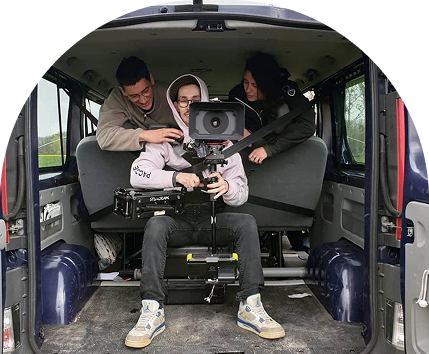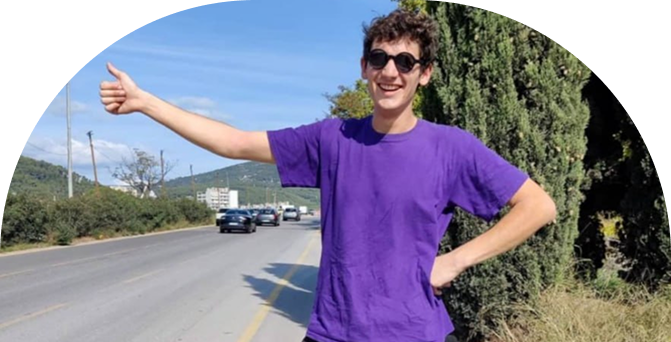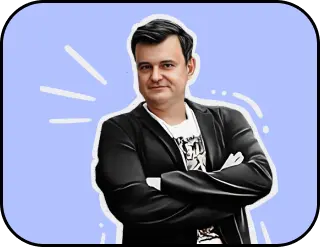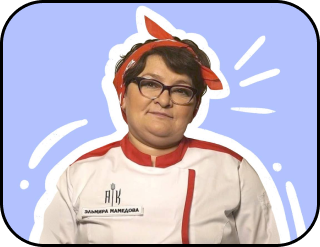French auteur on cinema's future

This interview is the story of a person who once fell in love with the language of cinema so much that he began to communicate in this language with people and create his own films. Today, this time only exists in his memories, but the editorial team of The Global Technology magazine was able to experience rare moments of nostalgia with the hero and ask him about the moment in a person’s life when they decide to make their first film. Together with the interviewee, we talked about the past and future of cinema, whether films should educate their audience, and whether life exists after cinema.
Answering our questions is the director of a series of short films, participant in the Festival court métrage in the city of RIOM, participant in the Garges fait son cinéma short film festival, winner of the most viewed film award at the Nikon Film Festival, best director at the Le festival de cinéma de Loches, and author of the film Silence — Gaultier Franiatte.

— Gaultier, perhaps this is not the most original question, but we truly want to know how a person comes to directing. What event or person influenced your decision to become a filmmaker?

— Thank you for the question. If you don’t mind, I will sometimes speak in the past tense. Speaking about my story, I became interested in cinema when I was a teenager — back then I watched a lot of different films and tried making my own movies with friends. I really enjoyed the filming process itself: the set, all the hustle and bustle, and the improvisation, the practicality of it all. Later on, I had experience working on other people’s projects with other people’s interesting scripts. I can say that for me, it was an exciting time — filming was always captivating, and I met a lot of people. It was a constant exchange, a crossing of different lives.
When I was making my own films, they were more like searches, reflections on life and choices — like in the film Silence, where the characters told their dreams. It was more about exploration, pure curiosity.

— Gaultier, thank you for your answer. So, can we say that making films was for you a way of communicating with the world?

— Probably, yes. I made a lot of short films, and perhaps some of them were really about the desire to express something through the screen, to say something, to give something, to establish contact with the audience. But other films of mine were more like adventures, kind of experiments — I wanted to try different styles, varied filming techniques. Yes, some of my films were my conversation with the world, and the rest were attempts and creative experiments.

— Then the next question will be unusual: at what point can a person who makes films call themselves a director?

— That’s indeed a difficult question. I think you can call yourself a director when you start making money from your films. Because, essentially, anyone who films anything with a camera could be considered a director. But in that case, the definition loses its meaning.
A person becomes a director when they make several films or a feature-length film. You know, there are many different kinds of cinema: there are feature films. And the making of one film, most often, is an attempt to try something new, while directing several films is about repeating and developing skills.

— It also happens that a director makes many films that are not known to the general public.

— Undoubtedly, so it is incorrect to say that a person becomes a director when they gain fame, because there are lesser-known directors who, nevertheless, make excellent films that audiences want to watch over and over again to experience the full range of emotions once more.

— Gaultier, since we’ve started talking about creating films as a way of communicating with the world, the next question seems to naturally follow: should cinema change society? Should it educate its audience in some way?

— Your question really resonates with me right now. Sometimes, I do think that directors or creators of art try to change me. But, unfortunately, it happens that those who create these works themselves don’t fully understand or, perhaps, don’t want to understand the complexity of reality. That’s why it is very important for the audience to always be able to maintain a distance from art. And then, it all depends on the film. For example, I really love comedies because I know — such films don’t try to change me; they just want to entertain me.

— Maintaining a distance from art can sometimes be difficult. I’m curious, how do directors themselves feel about the fact that the audience doesn’t always see in a film what the creators originally intended to convey?

— I think I understand why you asked this question. This is precisely what should be avoided in one’s creativity: the desire to show something to the audience. But, to be fair, I should say that when I made my own films, sometimes I too wanted to convey something to the public. But it was precisely these films that turned out to be my least successful ones: the least funny, the least engaging, the least sincere, the least spontaneous. Now, with time, I, as an audience member, understand: when a film tries to convey something to me, tries to force some theme into my head, I get bored, and I want to distance myself from it, to push it away. But if a film shows complex characters — neither good nor bad, neither black nor white — showing me real, human, plausible feelings and situations, that captivates me much more. So, reflecting on the fear that the message of a film might be misunderstood, I, as an audience member, don’t want something to be imposed on me, I don’t want to be given some “message” or life lesson. I don’t know if you agree with me or not.

— Gaultier, thank you for your answer. If we touch on the everyday experience of watching films, how do you usually watch them — as an audience member or as a director?

— Right now, I only watch films as a viewer. I don’t think I’ll return to directing anytime soon because I’ve discovered another kind of activity, equally fascinating and creatively rich. I enjoy watching films with ambiguous characters, through whom I realize that everyone has their own struggles, and it’s important to stick together, to understand each other a little more, and then everything will work out.
Yes, as a teenager, I wanted to make films because I grew up in a village, and films were my only door to this vast world. Then I started studying in Paris, and since I began living here, I’ve met many different people, and I got the impression that I no longer needed that door to communicate with the world. Perhaps it was from the desire to communicate with different characters that my passion arose, but it eventually faded because now I meet people from various countries, I travel a lot, and I work a lot.
I think cinema was my window to the world, but in that world, everything was too saturated, exaggerated — joy was exaggerated, sadness was exaggerated. The advantage of reality is that it can be less intense than in films, but this kind of reality captivates even more. Real reality is full of nuances and details. And that’s what fascinates me now.

— A very interesting answer, which smoothly leads us to the topic of the real and the artificial. Gaultier, if you had to describe the cinema of the future in two words, what would those words be?

— A difficult question. I think the cinema of the future will be short. Not quite — it will be either very short or very long.
It will be short because cinema is gradually being replaced by the creation of videos for TikTok and other social platforms. If we want entertainment, instead of going to the cinema for two hours, we can spend a few minutes on our phones. That’s life now.
On the other hand, cinema will get longer because of series. More and more people are watching series and immersing themselves in these universes with enthusiasm. So I think we are heading towards two extremes in length, two opposite poles: short and long cinema at the same time.

— Thank you for your answer. We have one more question about the future of cinema, and it concerns the fusion of genres in contemporary filmmaking. How do you perceive this trend?

— I like the film Everything Everywhere All at Once. It doesn’t have animation, but there are adventures, there’s humor. If the fusion of styles is done interestingly and well, I’m all for it. Again, there are days when you want to watch a serious film, and there are days when you want to dive into comedy. When a film is made well, it can mix all genres inside, and if such a combination is executed well, the film becomes a masterpiece. But if a film is filled with many styles just to show off the creator’s skills, the audience will pass by that film.

— Gaultier, who among famous historical figures would you like to meet or even work with?

— I’ve thought about this many times, and as strange as it may sound, the names that always come to mind are people who have nothing to do with cinema. They are company founders, scientists, political figures. If we’re talking about the film world, I would love to meet the directors of Everything Everywhere All at Once. Have you seen this film?

— Of course! This comedic action film was made by Daniel Kwan and Daniel Scheinert.

— That’s right. I like this film because it blends genres. It’s a story about a mother who runs a laundromat, has a strained relationship with her daughter, and they travel across different worlds. The film is about family, about the importance of staying together, and despite its deep meaning, it’s also very funny.

— That’s absolutely true. Now, since we’ve been talking about the past, were there any moments in your personal or professional life that you would like to change?

— No, because even the bad memories are part of who I am today. They’re part of what I am now. An undoubtedly valuable part. All the difficulties I’ve faced, all the bad moments I’ve managed to overcome, give me strength for the road ahead.
When we’re afraid of something, when we’re angry about something, we need to tell ourselves: “Do you remember how hard it was, but we made it through? We’ve already been through this together.” After those words, you need to focus, slow down, think, and act. But if none of us had any difficult experiences, what would we remember and how could we be proud of ourselves? So I’m grateful for everything.
In my current life role, I’m more creative than I was in cinema. When I worked on sets with other directors, I was afraid to propose anything, I didn’t want to take the initiative. On set, we agreed on everything: lighting, costumes, scripts.
Now, I’m constantly trying to create tools or systems to work effectively with my team. Paradoxically, I’m much more creative now than when I was a paid employee on a film set.

— Gaultier, is French cinema…different? Does the magic of French cinema exist?

— It’s hard for me to answer that question because I’m not sure whether there’s a magic to French cinema. There is probably cinema that appeals to the French audience, but it won’t necessarily be well received by the global audience. I know that romantic comedies are very popular in France. Maybe that’s some sort of self-irony? I’m not sure. How do you see French cinema?

— France has always been associated with romance and love.

— That’s probably a cliché, but in my personal life, it’s not really like that. I don’t know if you saw the opening ceremony of the Summer Olympics, but there were scenes there that could show that this association has lost its relevance.
But in French cinema, there is often seduction, and in most films, it’s still about the classic couple. Sometimes, clichés are based on a part of the truth. Clichéd representations are not always far from reality.

— ГGaultier, thank you for your explanation. Still, if we talk about the future of cinema as a whole, is there a chance that directors will prefer genuine art over commercial cinema?

— I no longer make predictions about the future. Every day in the world something new happens, so it’s hard to be sure about anything. Who knows what will happen in a few years? Maybe people will get tired of cinema altogether. Or maybe, on the contrary, global cinema will evolve. Perhaps other forms, similar to cinema, will appear?
Will filmmakers view cinema as a way to tell stories about themselves, about their time, or their country? I don’t know. But I do know that there are genres and types of storytelling characteristic of different countries.
Maybe today, with the advent of globalisation and the ability to freely communicate with the entire world, simple and somewhat simplified narratives, like those in movies, no longer work?
Some directors might follow my path — an ordinary young guy who loved cinema and dreamed, sitting in his village, of communicating with the world. And then, over time, they may lose the need for that kind of communication. Cinema once made a revolution, but now, with the rise of the internet, we know that there are other forms of interaction. Will they remain relevant in time? Who knows?
We know that all people are essentially similar to one another. Therefore, films about good and evil characters might be starting to bore the audience. Maybe that’s why social networks are gaining popularity — because some people show their real lives there. It could be self-care routines, cars, mechanisms, or the creation of various objects — it doesn’t matter.
Perhaps people have begun to doubt what they are shown in films. People are increasingly attracted to simple, real, and concrete things.

— Gaultier, thank you for your honesty. We have one last question. If we were to start filming right now, what role would each of us play?

— Forgive me, but I’m no longer a director, I don’t want to play with puppets, move people around, and give them roles. I don’t want to do that anymore. But I would be glad if someday we could meet together. That would be wonderful. Thank you very much.

The micro world makes particles dance to the melody of probability.
Thank you!




